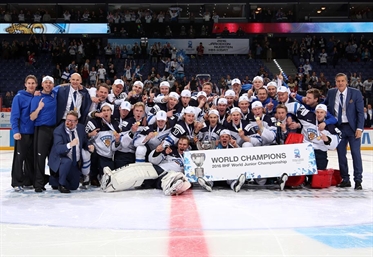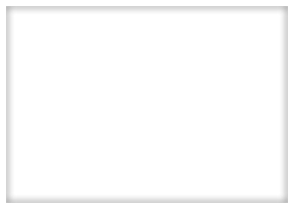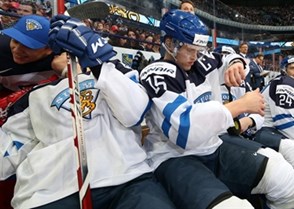Kapanen gives Finland gold
Finns win second title in last three years

 HELSINKI, FINLAND - JANUARY 5: Team Finland celebrate with the championship trophy after a 4-3 gold medal game win over Russia at the 2016 IIHF World Junior Championship. (Photo by Andre Ringuette/HHOF-IIHF Images)
HELSINKI, FINLAND - JANUARY 5: Team Finland celebrate with the championship trophy after a 4-3 gold medal game win over Russia at the 2016 IIHF World Junior Championship. (Photo by Andre Ringuette/HHOF-IIHF Images)
In the Russian zone, Aleksi Saarela found Kapanen, who eluded defenceman Sergei Boikov and circled the net to score on a wrap-around as goalie Alexander Georgiev reached haplessly with his stick.
"I got the puck, I saw their defenseman and I decided to take him on," said a smiling Kapanen. "The goalie bought my deke, so I went around the net."
This is Finland’s fourth World Junior gold medal of all time. They also won in 1987, 1998, and 2014. They have now earned gold at two out of the last three tournaments.
This is the greatest era in Finnish U20 history.
It was a euphoric moment of redemption for Kapanen, who had faced some criticism for scoring just once in last year's World Juniors. His OT winner will live forever in Finnish hockey lore.
"This is a big thing for all Finns, not just for Finnish hockey," Kapanen said. "The attention we’ve got has been overwhelming."
Finland's dynamic top line produced again. Patrik Laine and Sebastian Aho had a goal and an assist apiece, while Jesse Puljujarvi added two assists. Captain Mikko Rantanen got a late power-play goal to put Finland up 3-2 with 2:09 left.
"We just tried to enjoy the game as a once-in-a-lifetime opportunity -- a final in a World Championship in our home city," said Aho. "Everything was awesome."
Puljujarvi, who was named Best Forward and MVP of the tournament, said modestly: "The individual awards were a nice bonus. Probably can’t hurt."
Andrei Svetlakov scored twice for Russia, including the tying goal with just six seconds remaining, and captain Vladislav Kamenev added a single. Defenceman Ivan Provorov had two assists.
"We are the nation that battles until the last second," said Provorov. "We proved it here at the tournament and last year too. I’m happy to be Russian and happy to be playing for Team Russia."
En route to the title, the Finns scored 35 goals. It equals their offensive output in 1998, when they also defeated Russia in overtime for gold in Helsinki. Puljujarvi (17 points), Aho (14 points) and Laine (13 points) finished 1-2-3 in tournament scoring.
Despite the disappointment of settling for silver, the Russians can take pride in their consistency. They medaled for the sixth straight year, a current streak unmatched by any other nation. Their last gold medal was in 2011 in Buffalo under head coach Valeri Bragin. When using Bragin, they have always made the final (2005, 2011, 2012, 2015, 2016).
"I’m proud of our team," said Russia's Radel Fazleyev. "We did a good job. Congrats to Team Finland. They did an even better job."
Finnish head coach Jukka Jalonen added to his growing legend. He was also behind the bench when Finland won its last IIHF Ice Hockey World Championship gold medal in 2011, defeating Sweden 6-1 in the final in Bratislava. Jalonen captured the Finnish championship with HPK in 2006.
The Finns outshot Russia 29-25, and there was intrigue around the starting goalies.
Finland’s Kaapo Kakhonen took over the net from a shaky Veini Vehvilainen during the 6-5 quarter-final win over Canada. Ilya Samsonov, who played just once in the round-robin, shone in the 2-1 semi-final win over the U.S. after Georgiev stumbled in the 4-3 quarter-final overtime win versus Denmark. However, Bragin, well-known for juggling his goalies, reverted to Georgiev for the final.
The game got off to a torrid, physical start in front of the fired-up crowd of 13,479, including Finnish President Sauli Niinisto, at Hartwall Arena.
Georgiev fought the puck early on, but Kahkonen made the game’s first error, putting the puck over the glass for a delay-of-game penalty. On the Russian power play, Kamenev scored his team-leading fifth goal with a one-timer from the top of the faceoff circle that beat Kahkonen glove side at 4:50.
Russia cleverly dominated possession for long stretches. The Finns couldn’t convert their first man advantage late in the opening stanza, as the Russians blocked shots like men possessed. Shorthanded, Svetlakov raced around top-scoring Finnish blueliner Olli Juolevi and flicked one off the crossbar.
The Puljujarvi line started to turn the tide with a dominant forecheck midway through the game. Rantanen came within a hair’s breadth of setting up the equalizer when he found Roope Hintz right in front.
"They have a good team and they defend well," said Kahkonen. "I’m just glad that we got the goals we needed."
Just 24 seconds into the third, Finland drew even on a spectacular rush. Aho sent a deft backhand to Laine and he whizzed the puck over a kneeling Georgiev on the stick side. The goal was Laine's seventh, tying him with the U.S.'s Auston Matthews for the tournament lead.
Russia had an answer 1:17 later. From the left faceoff circle, Svetlakov zapped a high shot over Kahkonen's glove to make it 2-1. He celebrated wildly, clutching the national crest on his jersey. The go-ahead goal came just seconds after Antti Kalapudas was denied on a glorious chance at the side of the Russian net.
The hosts tied it up at 2-2 at 10:07. Laine bumped defenceman Alexander Mikulovich behind the goal line and Puljujarvi grabbed the puck and circled out to send a beautiful cross-ice feed to Aho that he banged home.
Russia ran into penalty trouble late in the third. With 4:08 left, defenceman Dmitri Sergeyev got caught pulling down Aho, and Jalonen called his time-out to strategize.
It paid off, as Finland's top-ranked power play finally clicked. Rantanen skated in front of Georgiev and tipped home Vili Saarijarvi's wrister from the centre point at 17:51. Hartwall Arena went ballistic. Kamenev was kicked out of the game for unsportsmanlike conduct, violently protesting after the goal and smashing his stick.
But the never-say-die Russians weren't done. Bragin pulled his goalie with 1:23 remaining, and the gambit paid off. Provorov moved into the middle and lofted a shot that deflected in off Svetlakov to make it 3-3 at 19:54.
"Yeah, we figured we’d make it a little longer night for people," quipped Saarela.
The final result emphasizes that anybody can beat anybody in today’s World Juniors. No team has won back-to-back titles since Canada’s record-tying run of five straight (2005-09).
"The last three games were one-goal games," said Kakhonen, reflecting on the playoffs. "It’s pretty tight in a tournament like this."
In the big IIHF picture, Finland and Russia have broken each others’ hearts on several occasions recently. It goes beyond Yevgeni Kuznetsov’s heroic three-point effort in Russia’s 4-3 overtime win over Finland in the 2011 World Junior semi-finals.
At the 2014 Olympics, Finland famously eliminated host Russia with a 3-1 quarter-final win. The Finns also spoiled the home-ice party in Moscow at the 2007 World Championship with Mikko Koivu’s 2-1 semi-final OT winner, and won 3-0 with Mikael Granlund’s “lacrosse” goal in the 2011 semis in Bratislava before taking gold.
The Russians dominated Finland 6-2 in the 2012 World Championship semi-final en route to gold in Helsinki, and won 5-2 in the 2014 final in Minsk.
Only three countries have ever won the World Juniors on home ice. They are Canada (1991,1995, 2006, 2009, 2015), Finland (1998, 2016) and the Soviet Union (1983).
Finland will kick off its defence of its World Junior title on 26 December at the 2017 IIHF World Junior Championship in Canada (Montreal and Toronto).






















































